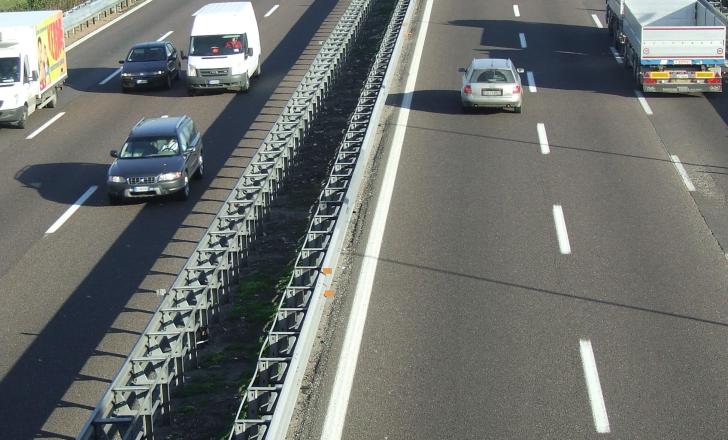The International Road Transport Union (IRU) and the European Transport Workers Federation (ETF) are calling for urgent action on road transport. As EU Social Partners for Road Transport, both organisations agreed a joint statement and this includes six measures which they insist, as a minimum, must form part of an urgently-needed road transport recovery plan to be coordinated and realised by the European Commission together with EU Member States.

Urgent action needed: in recent months falls of up to 50% in road freight transport activity have been observed
The 1203 International Road Transport Union (IRU) and the European Transport Workers Federation (ETF) are calling for urgent action on road transport.
As EU Social Partners for Road Transport, both organisations agreed a joint statement and this includes six measures which they insist, as a minimum, must form part of an urgently-needed road transport recovery plan to be coordinated and realised by the2465 European Commission together with EU Member States.
Michael Nielsen, IRU general delegate to the EU said: "This is a landmark joint message from workers and employers in road transport. The road transport sector has been hit hard by the recession and we need concerted action to get through this time of crisis.
"In recent months falls of up to 50% in road freight transport activity have been observed, while a 10% drop in world tourism is now severely impacting coach transport. Bankruptcies have doubled and at least 140,000 jobs in the EU road transport sector have gone.
"The Social Partners recognising road transport's pivotal role in the economy, and as a massive supplier of European jobs, call on national and EU authorities to cease talking and start putting in place some urgently needed and concerted actions to mitigate the impact the crisis has had on the road transport sector."
Concretely, the Social Partners insist that EU Member States and the EC must urgently do more to encourage financial institutions to reopen credit lines to road transport companies; adopt employment schemes enabling skilled labour to stay in road transport rather than lose their jobs, and reduce fuel costs and stop adding other external charges.
The organisations say there is a need to ensure through the provision of incentives that the crisis does not stop company investments in training or stop such investments in newer, cleaner and safer vehicles, and there is the need to reinvest more than ever in infrastructure (including safe parking facilities) to stem the flow of unnecessary costs incurred from congestion and crime.
"We need to see the European Commission assume the leadership role that it claims," Michael Nielsen added. "Now is the time for the EC to match aspirations with actions and to demonstrate an ability to act when it counts.
"Together with national governments it must implement a recovery plan without delay fulfilling all the points outlined by the Road Transport Social Partners as well as the actions called for previously by the IRU in its Resolution on the economic crisis."
The IRU and the ETF maintain that an EU road transport recovery strategy is a pre-requisite for a general economic recovery because every citizen needs mobility and every company needs road transport services to connect their businesses to world markets.
The Social Partners for Road Transport say they are united behind one message: that any penalty on road transport is an even greater penalty on the economy as a whole, and that further facilitating road transport will stimulate a faster economic recovery.
As EU Social Partners for Road Transport, both organisations agreed a joint statement and this includes six measures which they insist, as a minimum, must form part of an urgently-needed road transport recovery plan to be coordinated and realised by the
Michael Nielsen, IRU general delegate to the EU said: "This is a landmark joint message from workers and employers in road transport. The road transport sector has been hit hard by the recession and we need concerted action to get through this time of crisis.
"In recent months falls of up to 50% in road freight transport activity have been observed, while a 10% drop in world tourism is now severely impacting coach transport. Bankruptcies have doubled and at least 140,000 jobs in the EU road transport sector have gone.
"The Social Partners recognising road transport's pivotal role in the economy, and as a massive supplier of European jobs, call on national and EU authorities to cease talking and start putting in place some urgently needed and concerted actions to mitigate the impact the crisis has had on the road transport sector."
Concretely, the Social Partners insist that EU Member States and the EC must urgently do more to encourage financial institutions to reopen credit lines to road transport companies; adopt employment schemes enabling skilled labour to stay in road transport rather than lose their jobs, and reduce fuel costs and stop adding other external charges.
The organisations say there is a need to ensure through the provision of incentives that the crisis does not stop company investments in training or stop such investments in newer, cleaner and safer vehicles, and there is the need to reinvest more than ever in infrastructure (including safe parking facilities) to stem the flow of unnecessary costs incurred from congestion and crime.
"We need to see the European Commission assume the leadership role that it claims," Michael Nielsen added. "Now is the time for the EC to match aspirations with actions and to demonstrate an ability to act when it counts.
"Together with national governments it must implement a recovery plan without delay fulfilling all the points outlined by the Road Transport Social Partners as well as the actions called for previously by the IRU in its Resolution on the economic crisis."
The IRU and the ETF maintain that an EU road transport recovery strategy is a pre-requisite for a general economic recovery because every citizen needs mobility and every company needs road transport services to connect their businesses to world markets.
The Social Partners for Road Transport say they are united behind one message: that any penalty on road transport is an even greater penalty on the economy as a whole, and that further facilitating road transport will stimulate a faster economic recovery.





